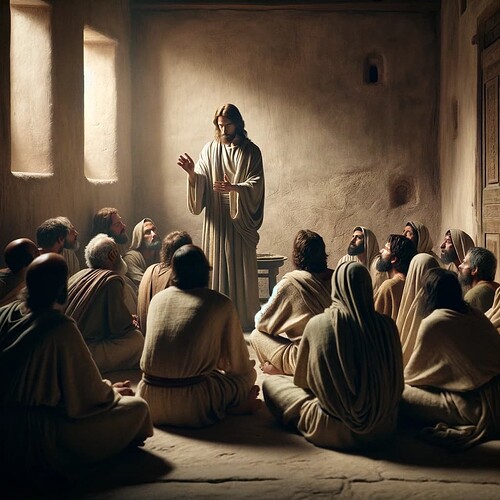![]() January 16: Matthew 18 - Lessons in Humility, Forgiveness, and Community
January 16: Matthew 18 - Lessons in Humility, Forgiveness, and Community
Embracing the Kingdom Values of Jesus
 Introduction
Introduction
On January 16th, our journey through the Gospel of Matthew brings us to chapter 18, where Jesus imparts crucial teachings on humility, forgiveness, and how to live in a community of believers. These teachings are pivotal for understanding the values of the Kingdom of Heaven.
 Matthew 18: Humility and Forgiveness
Matthew 18: Humility and Forgiveness
Matthew 18 opens with Jesus teaching about the importance of humility, using a child as an example. He then addresses the critical issue of forgiveness and how it’s essential in the life of a believer, emphasizing reconciliation and persistent forgiveness.
Key Verse: “Truly I tell you, unless you change and become like little children, you will never enter the kingdom of heaven.” — Matthew 18:3
 Key Themes and Reflections:
Key Themes and Reflections:
The Greatness of Humility: Jesus overturns worldly concepts of greatness, placing child-like humility at the heart of Kingdom life.
Forgiveness and Reconciliation: The chapter underscores the necessity of forgiveness in the Christian community, illustrated by the Parable of the Unforgiving Servant.
Community Guidelines: Jesus provides practical instructions for resolving conflicts within the community, valuing every individual member.
 Today’s Application:
Today’s Application:
Consider how you can embody humility in your daily interactions. Reflect on your attitude towards forgiveness, and strive to be more forgiving as Jesus teaches. Apply Jesus’ guidelines for resolving conflicts in your community and relationships.
 Hidden Gem:
Hidden Gem:
Did you know? The instruction of “where two or three gather in my name, there am I with them” emphasizes the presence and power of Christ in the midst of His followers, no matter how small the gathering.
 Reflective Q&A:
Reflective Q&A:
![]() Matthew 18: Kingdom Values
Matthew 18: Kingdom Values
![]() Embracing Humility: How can adopting a child-like humility transform our understanding of greatness and success?
Embracing Humility: How can adopting a child-like humility transform our understanding of greatness and success?
A: Embracing child-like humility shifts our focus from self-promotion to servanthood, fostering a community-centered approach that values others over personal ambition.
![]() The Heart of Forgiveness: Why is forgiveness essential in the Christian community, and how can we cultivate a forgiving spirit?
The Heart of Forgiveness: Why is forgiveness essential in the Christian community, and how can we cultivate a forgiving spirit?
A: Forgiveness is essential for maintaining harmony and healing in the community. Cultivating a forgiving spirit involves understanding the depth of God’s forgiveness towards us and extending that grace to others.
 Join the Discussion:
Join the Discussion:
How do the teachings in Matthew 18 impact your approach to community, relationships, and personal growth? Share your insights and experiences in the comments.
#Matthew18 #Humility #Forgiveness #ChristianCommunity #BibleStudy #SpiritualGrowth
![]() Deepening Your Faith: Join us tomorrow as we continue exploring the profound teachings of Jesus in the Gospel of Matthew.
Deepening Your Faith: Join us tomorrow as we continue exploring the profound teachings of Jesus in the Gospel of Matthew.
 Join the forum!
Join the forum!
Grow in your faith with our AIgniteScripture Community:
Free Members: Participate in lively discussions and explore a treasure trove of biblical resources. Sign up here: 🌟 How to Join Page - Membership Options
Supporters Membership ($20/month or $200/year): Engage more deeply with personalized content, newsletters, and an interactive community experience. Become a Supporter: 🌟 How to Join Page - Membership Options
![]() Stay Informed with our AIgniteScripture Newsletter: Stay updated with daily readings and insights. Be part of our journey through the Gospel: https://newsletter.aignitescripture.com/
Stay Informed with our AIgniteScripture Newsletter: Stay updated with daily readings and insights. Be part of our journey through the Gospel: https://newsletter.aignitescripture.com/
